Many sustainability reports published in 2022 lack a strong sustainability narrative. That’s because many of them focus on reporting for the sake of it and checking the boxes, and that’s pretty unfortunate.
A sustainability report is, in actual fact, a fantastic way to demonstrate your company’s sustainability commitment, and doing so using a strong narrative — text and visuals combined — is imperative (especially if you want the report to be read by a range of stakeholders!).
Below I outline ten tips on how to make your sustainability report more interactive, engaging, and interesting:
10 Tips on How to Make Your Sustainability Report More Interactive
1. Use URLs Where Possible
If we think of interactivity, we often think of URLs. Adding URLs to a report greatly helps the reader/user to navigate the report, especially if they come across a term or a name of an organisation they do not know much about and can easily click to read more or visit the relevant website.
You can include URLs in a report in various ways besides adding URLs to company names, organisations (i.e. the UN), or industry-specific terms or phrases. You can, for example, also link to the 17 UN SDGs so whoever reads a single page of the report can quickly and easily navigate to the respective SDG on the official UN SDG website.
Another example of URLs can be found in Heineken’s 2022 Annual Report (with the Sustainability Report combined), whereby a hyperlink on the bottom right of many pages allows the user easy access to the most relevant website.
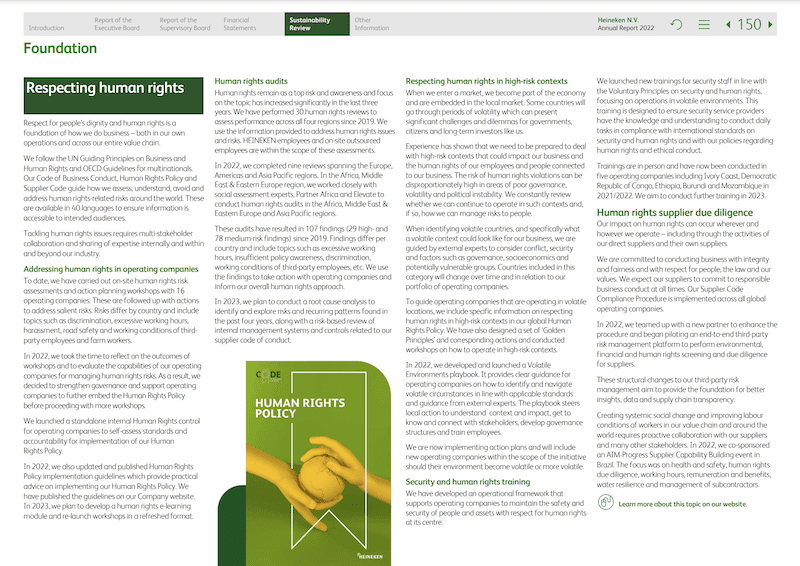
2. Use Photos of Real People and Real Events
Just look at Nike’s 2022 sustainability report, or ‘impact report.’ This report is a great example of how the company has used real images of people to heighten the visual effect of the report. These are not stock photography or staged photos, making them so much more powerful. Try to source photos from inside your company that demonstrate sustainability projects or initiatives (remember always to gain consent for including any individuals depicted in the photos). Note — choose your use of photos carefully. Too often, I’ve seen that photos are not carefully considered (for example, reports that do not have photos that demonstrate sufficient diversity in terms of individuals represented). For this, you can consult a DEI expert.
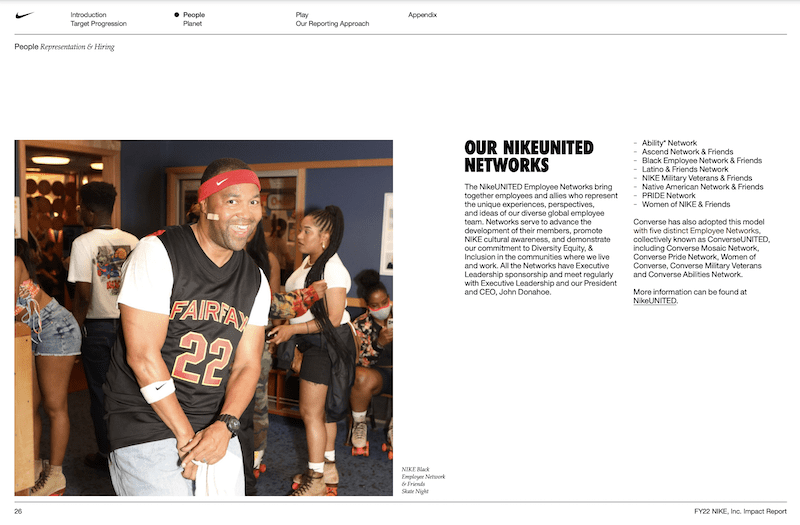
3. Use Simple, Powerful Graphs and Charts
Complex illustrations, infographics, graphs, or charts can confuse the reader. Try to ensure your graphs or charts are as clean looking as possible and place them next to text blocks to ensure a nice visual balance. Use the same colours used in the graphic throughout the report to ensure coherency. See two powerful, minimalistic examples from Nike’s 2022 Impact Report and Apple’s 2022 ESG Report below:
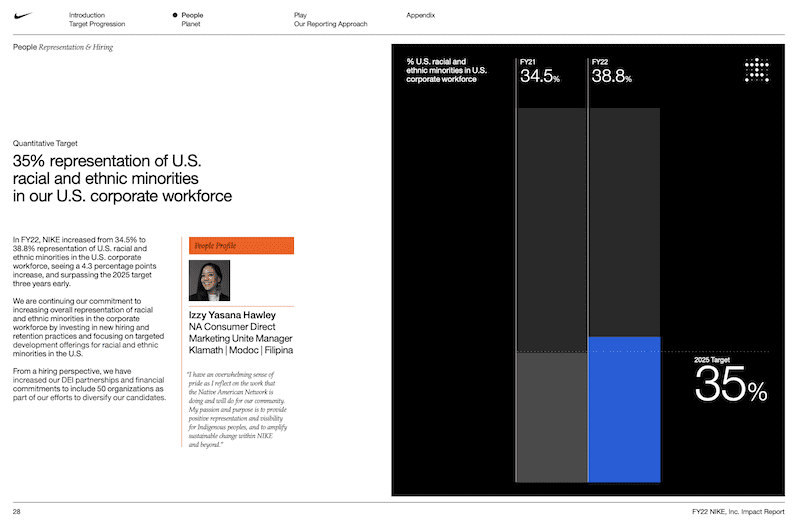
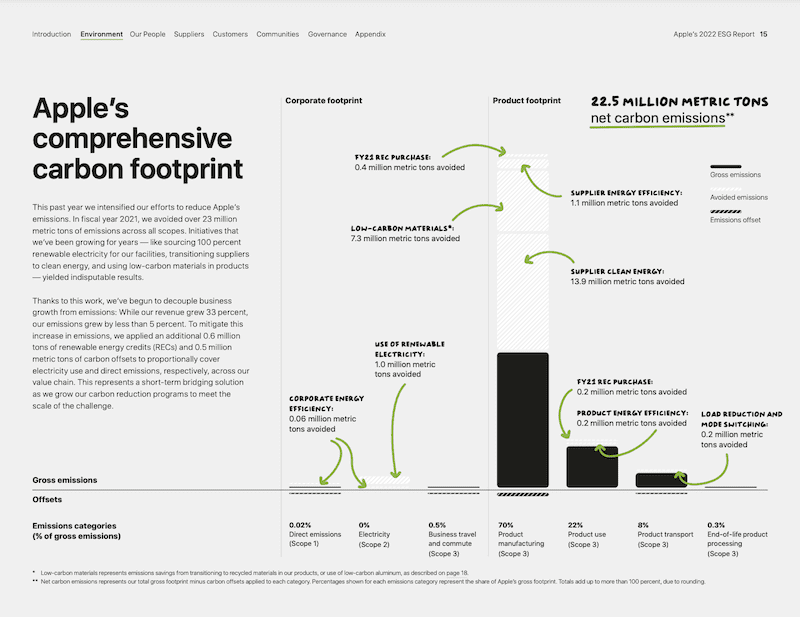
4. Add Images to the Governance Section
In many sustainability reports, the governance section is often the ‘driest’ regarding visual elements. The Dümmen Orange 2022 Sustainability Report spruces things up by quite effectively adding photos of each member of the company’s global ESG team (many with flowers and plants in the background — which importantly links to the company’s role as a leading global breeder and propagator of ornamental flowers and plants).
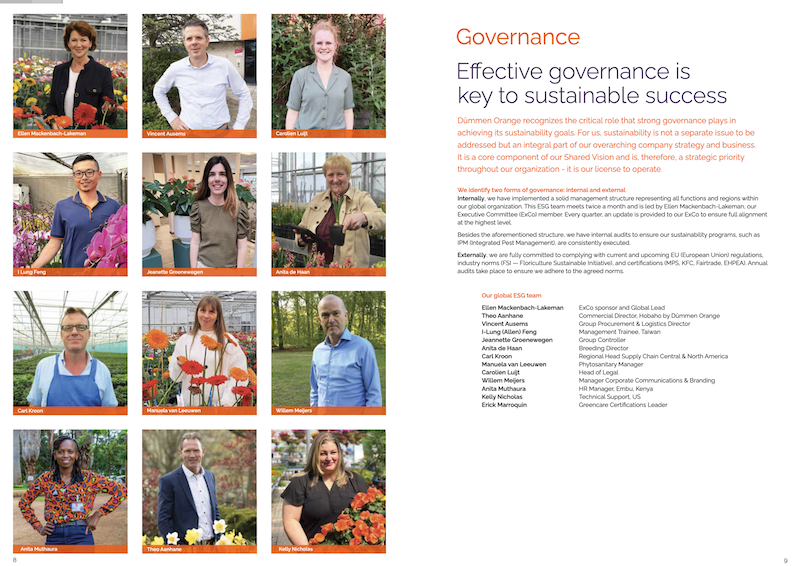
5. Include a Visual Timeline
In 2023, Heineken merged its financial and non-financial reporting in a single document. I can’t say I’m a fan of the stock photography used throughout the report (although some photos are not staged). However, some of the visuals are impactful, especially this timeline (as seen below). Including a timeline of your company’s goals is a great way to spice things up and demonstrate a road map for the future.
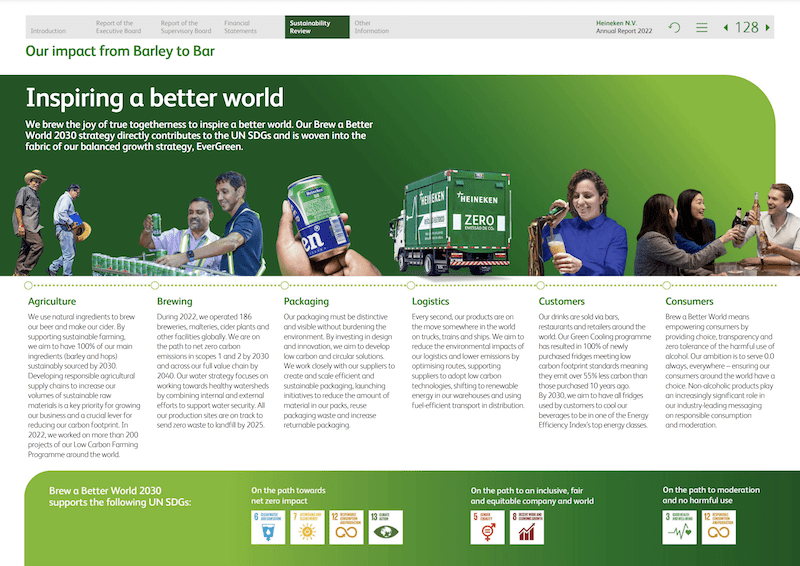
Keep Reading — How to Make Your Sustainability Report More Interactive…
6. Use Conversational Language
Steer clear of corporate jargon that creeps into reports. Step back and ask yourself what is actually being said and what you actually want to say. Then reword this in a clearer and more to-the-point manner.
For example, instead of saying, ‘Our aim is to…’, you can say, ‘We aim to…’ — the use of ‘we’ here is much more open and accessible than ‘our.’ I’ve read so many sustainability reports lately, and I’m also pretty sick of the phrase, ‘We are committed to…’ Try to mix things up and find synonyms as far as possible.
7. Add Interviews and Photos
Dümmen Orange 2022 Sustainability Report includes interviews with individuals involved in sustainability projects and initiatives (together with their photos). This makes the report more of a narrative since it has a strong storyline and a human focus instead of merely presenting statistics or figures. Absolutely anyone interested in sustainability at this company can pick up the report and read it without being an expert in the field of ESG.
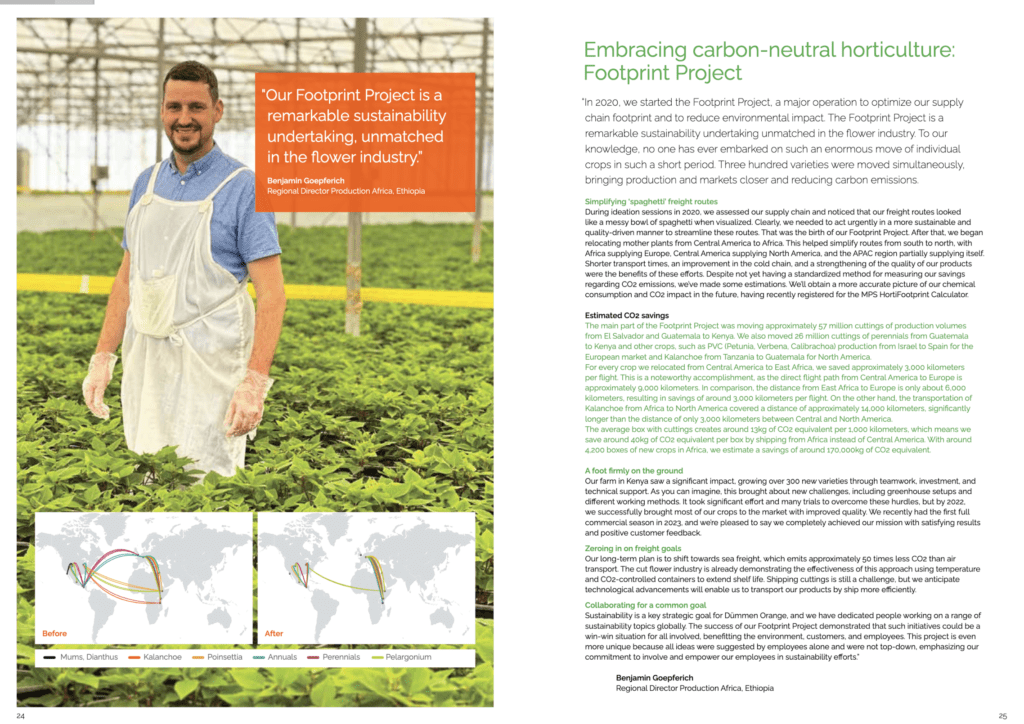
8. Create a Web-Based Version in Addition to a PDF
KLM does this pretty well. As part of their 2022 Annual Report (combined with Sustainability Report), they offer both a downloaded PDF and an interactive, web-based version of the report whereby you can zoom in on the text a little (I can imagine this also has a great impact on the accessibility of the document).
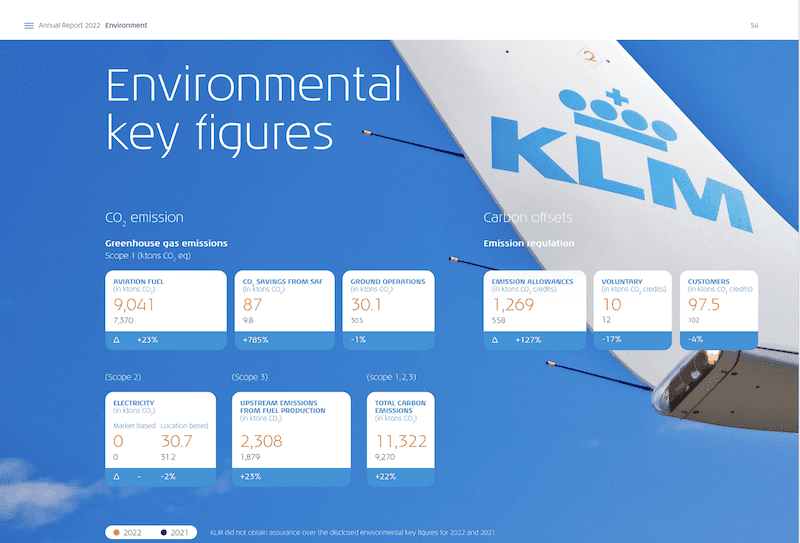
9. Highlight Important Stats and Figures
Apple’s 2022 ESG Report does this quite nicely and in a way that doesn’t detract from the text too much. For example, the page below takes three simple percentages and places them in a bigger font at the bottom left. This is done similarly throughout the report on pages where there’s a notable figure to include and mention. It’s not rocket science and helps draw attention to these percentages.
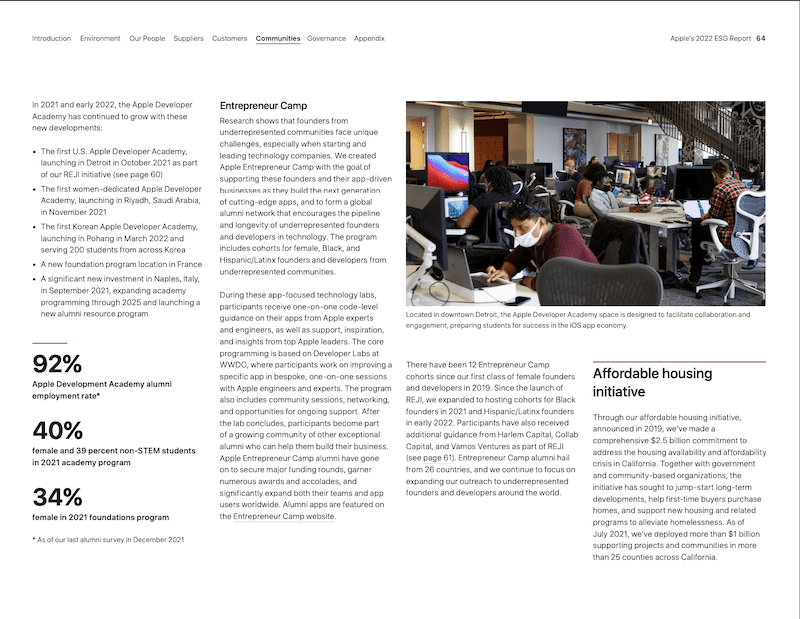
10. Make the Images Impactful
Microsoft’s 2022 Environmental Sustainability Report is visually impressive as it combines awe-inspiring, high-resolution photographs of nature. The report is truly spectacular from the very first page, and this heightens the reader’s interest and is likely to increase engagement levels and interest in the topics included.
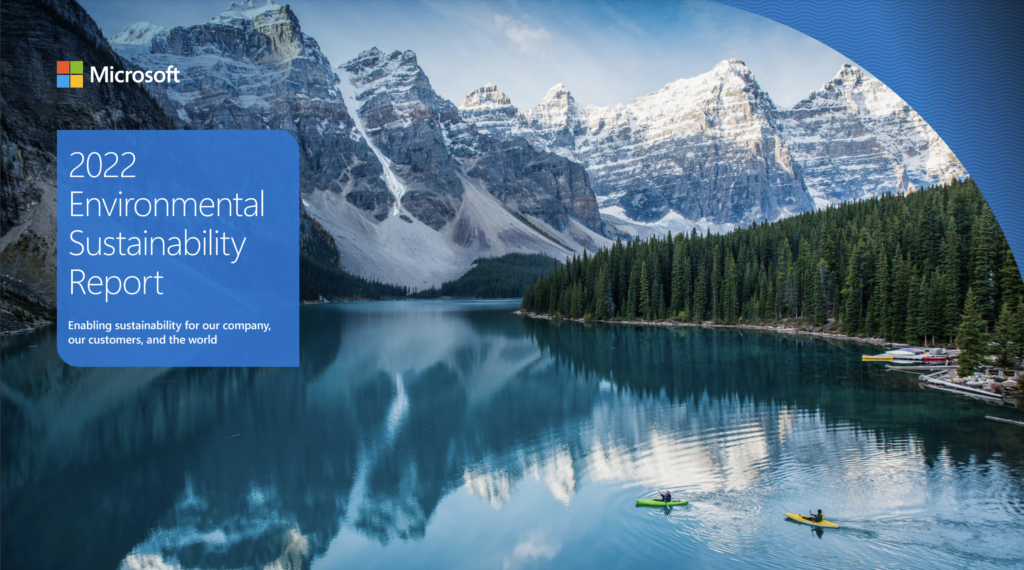
Do you have any other ideas on how to make your sustainability report more interactive or exciting? Feel free to comment below. I’d love to hear your thoughts on the work your company is doing to heighten your company’s sustainability narrative.
You can also drop me an email: info[AT]elizabethjoss. com if you wish to discuss how I can help you through my work as a sustainability report writer.
